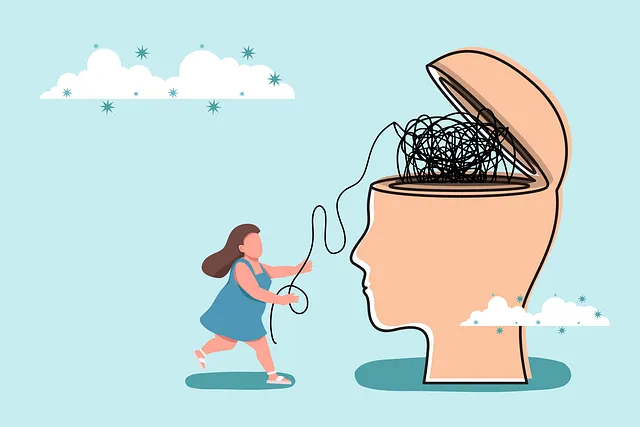Arvada and Kaiser have partnered to enhance mental health support through holistic, evidence-based practices. Using the RFM (Risk, Frequency, Magnitude) model, they identify individuals at high risk of mental health challenges and tailor interventions, including communication strategies and social skills training. Resilience Building Exercises (RBE) are integrated into healthcare routines at Kaiser to combat burnout, benefiting both professionals and personal lives. By offering RBEs in diverse formats and public awareness campaigns, Arvada and Kaiser create accessible programs that significantly impact community mental health. Structured assessments track the success of these initiatives, informing resource allocation and improving patient outcomes.
“Unleashing resilience is a powerful strategy for enhancing mental well-being, and that’s where the Relationship, Frequency, and Moment (RFM) model steps in. This article explores how RFM, when combined with Resilience Building Exercises (RBE), can significantly impact stress management. We shine a spotlight on an innovative partnership between Arvada and Kaiser, showcasing their collaborative efforts to promote mental health. Discover practical strategies for implementing RBE programs effectively and learn key metrics for measuring the success of RFM initiatives.”
- Understanding RFM and its Impact on Mental Resilience
- Arvada and Kaiser: A Partnership for Enhanced Well-being
- The Role of Resilience Building Exercises (RBE) in Stress Management
- Implementing RBE Programs: Strategies and Best Practices
- Measuring Success: Evaluating the Effectiveness of RFM Initiatives
Understanding RFM and its Impact on Mental Resilience

Resilience is a cornerstone of mental health and well-being, especially in today’s fast-paced world. The RFM (Risk, Frequency, and Magnitude) model offers a structured approach to understanding an individual’s resilience and their potential for coping with stress or traumatic events. By assessing these factors, mental health professionals can tailor interventions to enhance resilience, which is particularly relevant in the case of Arvada residents seeking Kaiser’s services.
In terms of risk management planning for mental health professionals, the RFM model helps identify individuals who may be more susceptible to mental health challenges. For instance, those with higher risk levels might include people facing chronic stress or those with a history of trauma. Through effective communication strategies and social skills training, mental health professionals can guide clients in managing their risks and building resilience. This proactive approach ensures that Arvada’s Kaiser services are equipped to provide comprehensive care tailored to each individual’s unique needs.
Arvada and Kaiser: A Partnership for Enhanced Well-being

Arvada and Kaiser have formed a powerful partnership focused on enhancing well-being, particularly in the realm of mental health support. This collaboration leverages the strengths of both entities to offer comprehensive solutions for individuals seeking improved mental health and resilience. Arvada’s expertise in fostering positive thinking and self-awareness exercises is perfectly complemented by Kaiser’s renowned trauma support services.
By joining forces, they create a supportive environment where people can access a range of evidence-based practices designed to build mental fortitude. This partnership exemplifies the power of community initiatives in promoting holistic well-being, offering practical tools for navigating life’s challenges and cultivating resilience.
The Role of Resilience Building Exercises (RBE) in Stress Management

Resilience Building Exercises (RBE) play a pivotal role in managing stress, particularly within the demanding healthcare sector. These exercises are designed to empower individuals, such as those at Arvada’s Kaiser, to navigate challenging situations with enhanced mental fortitude. By integrating RBE into their routines, healthcare providers can effectively combat burnout, which is a significant concern in this field. Such exercises foster positive thinking and improve overall well-being, ensuring professionals can maintain optimal performance without succumbing to stress-related drawbacks.
The implementation of RBE encourages a proactive approach to stress management, serving as valuable burnout prevention strategies for healthcare providers. These exercises are not just confined to professional settings but can be incorporated into personal routines, making them a holistic tool for mental health care. Positive thinking, cultivated through regular practice, becomes an ally in navigating life’s stresses, including the demanding nature of healthcare work.
Implementing RBE Programs: Strategies and Best Practices

Implementing Resilience Building Exercises (RBEs) in communities like Arvada, within Kaiser’s focus on mental health, requires strategic and thoughtful approaches. One key strategy involves tailoring programs to meet the diverse needs of residents, ensuring accessibility for all. This can include offering RBEs in various formats—group sessions, online platforms, or even community events—to cater to different preferences and schedules. For instance, Compassion Cultivation Practices (CCPs) have shown promise in fostering emotional well-being and reducing stress, making them a valuable tool within such programs.
Public Awareness Campaigns Development is another best practice. Educating the public about mental health challenges and resilience can foster a supportive environment. These campaigns can highlight the importance of coping skills development, encouraging individuals to learn and practice techniques that enhance their ability to cope with stress and adversity. By combining these strategies, Arvada and Kaiser can create comprehensive RBE programs that positively impact the mental health landscape within the community.
Measuring Success: Evaluating the Effectiveness of RFM Initiatives

Measuring success is a critical aspect of evaluating the effectiveness of RFM initiatives, especially in mental health care settings like Arvada’s Kaiser. By implementing structured assessment tools and collecting quantitative and qualitative data, practitioners can gain insights into the impact of resilience-building exercises. This involves tracking participant engagement, retention rates, and changes in mental health symptoms over time. For instance, regular self-care practices and burnout prevention strategies for healthcare providers can be assessed through surveys and interviews, providing valuable feedback on their effectiveness.
Additionally, risk management planning for mental health professionals is enhanced by these evaluations. By identifying areas where RFM exercises excel or require refinement, organizations can ensure that resources are allocated efficiently. This data-driven approach fosters continuous improvement in self-care practices among healthcare providers, ultimately contributing to better patient outcomes and a healthier work environment at Arvada’s Kaiser and similar institutions.
The implementation of Resilience, Flexibility, and Mentality (RFM) programs, particularly through Resilience Building Exercises (RBE), has proven to be a game-changer in stress management. Partnerships like the one between Arvada and Kaiser exemplify how organizations can foster mental well-being by integrating RFM initiatives. By following best practices for program implementation and measuring their effectiveness, businesses and communities can enhance resilience among their members, ultimately creating a more vibrant and adaptable workforce. This collaborative approach, focusing on RFM, is a testament to the power of leveraging mental health strategies in today’s fast-paced world.



